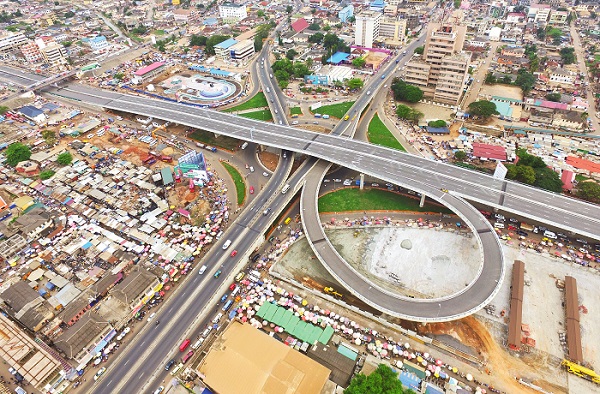
The Kwame Nkrumah Interchange in Accra was built and opened to the public in 2016 to help decongest the area and allow the free flow of traffic, as the original circle had outlived its usefulness, in view of the increase in traffic, both human and vehicular.
However, after a brief respite, we are back to square one, seven years after the opening of the interchange, as the disorder in the area has returned, this time in a worse condition.
The chaos at the place now is not because the interchange has failed to deal with the traffic situation but because city authorities have failed to bring sanity to the area.
Human beings always do what suits them or is convenient for them, and that is why there are laws to whip people in line.
But it seems our laws are just in the statutes.
The Kwame Nkrumah Interchange, like other such structures in city centres elsewhere, is very important because it is the central point of the national capital where many people (about three million daily) transit when commuting to other parts of the city and other towns in the country or to do business.
Unfortunately, the place has gradually been turned into a jungle where only the strongest survive, while law enforcers and city authorities look on helplessly.
The question that begs for an answer is: How did we get here?
And the answer is simple: Enforcement of the city’s bye-laws has been so weak over the years that it has culminated in the disarray in the area.
If care is not taken and action taken now, the area will become a no-go area and will become the hotbed of criminal activities, with mentally challenged persons and beggars also joining in to make the place unwelcome.
Indeed, Circle has long been notorious for the mugging of pedestrians, but things are getting to a head now because of the chaotic nature of activities there, which has also contributed to insanitary conditions and the constant pollution of the Odaw drain.
City centres the world over attract hordes of people who visit to do shopping and business and commute to other areas, but those centres are not chaotic because city authorities are up and doing and any disregard for or flouting of the laws on the parking of vehicles, trading and even crossing the road anyhow attracts a fine and you dare not refuse to pay because you will be fished out.
Some years ago when the late WOII Salifu Amankwah was the landlord of the Kwame Nkrumah Circle, no one dared misbehave there, which kept the area in order all the time, although some excesses resulted in the death of an aged man.
While the Daily Graphic is not calling for such brute force to be used on people who throng the Nkrumah Circle daily for various reasons, we are calling for the city authorities especially the Korle Klottey Municipal Assembly (KKMA), led by Samuel James Nii Adjei Tawiah to stamp its authority in the area for sanity to prevail.
For example, it does not make sense that in spite of a pedestrian mall that has been built to take care of hawkers, we still have people (both sellers and buyers) trading on the pavements, leaving pedestrians with no choice but to walk on the streets and forcing vehicles to use one lane and move at a snail’s pace.
What is wrong is wrong and we must not allow people to sell on the streets and pavements for whatever reason
By creating the human and vehicular traffic, we have also made the area very conducive for all manner of criminal activities, including pickpocketing, such that the area is no longer safe for people who go there to do genuine business or pick transport.
We urge the resourcing of the KKMA and other assemblies linked to the area to bring some order there.
For starters, we must also ensure that more policemen are roped in to clear traders from the pavements, penalise members of the public caught buying things from hawkers and street vendors and fine drivers who stop or park anywhere they like to pick up or drop off passengers at will.
We must clear all makeshift and illegal structures at the city centre that have become an eyesore to make the place comely – we must not politicise this activity, so that it is sustained.
The Daily Graphic calls on the Greater Accra Regional Minister, Henry Quartey, to take charge of the exercise of making the Nkrumah Interchange beautiful once again, and we pledge our support to this endeavour. Enough is enough!